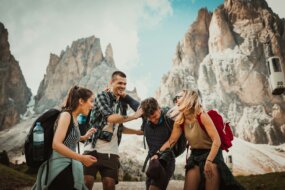
It’s late in the evening. You’ve had one of those days—meetings running over, a to-do list that only grew longer, and the creeping feeling that your health and peace of mind are slipping through the cracks. You open your phone, and instead of scrolling aimlessly, you find a calm voice suggesting a two-minute breathing exercise. You do it, and for the first time all day, you pause.
That’s not a therapist sitting in your pocket. That’s AI, gently stepping in to help you care for yourself.
1. The Gentle Reminder You Needed
We live in a world where it’s easier to ignore our well-being than to nurture it. AI can be that subtle friend who notices what you’ve forgotten.
- Wearables + AI can sense when your stress levels rise and nudge you to breathe, drink water, or stretch.
- AI-powered habit trackers don’t just log numbers; they recognize patterns—like when you tend to skip meals or sleep late—and encourage healthier routines.
It doesn’t feel like a lecture, it feels like a reminder from someone who cares.
2. Making Mental Health More Accessible
Not everyone can afford therapy or has the confidence to ask for help. AI is starting to bridge that gap:
- Chatbots designed for emotional support give people a safe space to talk—without fear of judgment.
- AI apps can detect shifts in mood from language and tone, offering early intervention before stress or depression deepen.
Of course, AI can’t replace human connection, but it can be the first step that helps someone feel less alone.
3. Personalizing Wellness in Ways Humans Can’t
Think about the wellness advice we often get—it’s one-size-fits-all. But your body, your mind, your lifestyle—they’re unique. AI thrives here.
- It can analyze your sleep patterns, nutrition, and daily activity, then give you advice that fits your rhythms, not generic rules.
- It can recommend guided meditations, workouts, or music therapy tailored to your mood and energy levels.
Instead of chasing what works for others, AI helps you discover what truly works for you.
4. Creating Time for What Matters
Well-being isn’t just about eating better or exercising—it’s also about feeling lighter, more in control. AI can handle the invisible stressors:
- Managing schedules, automating repetitive tasks, organizing your notes, even handling reminders—so your mental bandwidth is freed up.
- Imagine logging off work without the weight of unfinished “tiny tasks.” That space is wellness, too.
5. The Human Side of AI in Wellness
The most powerful part? AI isn’t here to take away the human journey of healing and self-discovery—it’s here to support it. It’s the friend who checks in, the coach who adapts to your needs, the planner who helps you breathe easier.
But the key is balance. AI is a tool. The heart of wellness will always come from you—your choices, your community, your desire to live fully. AI just makes the path a little clearer, a little easier, and sometimes, a lot more hopeful.
🌱 Final Thought:
Well-being doesn’t always come in grand gestures. Sometimes, it’s in those small, everyday nudges that remind you to pause, reflect, and care for yourself. And if AI can be that companion in your pocket—quietly cheering for your health—maybe technology isn’t taking us further away from ourselves. Maybe it’s guiding us back.






